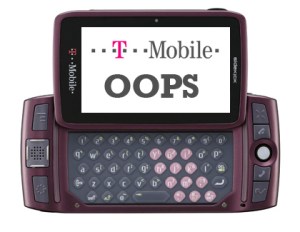
T-Mobile has announced that it will be shutting off the Danger Services for T-Mobile Sidekick phones on May 31 of this year. At that point, anyone still using a Sidekick phone will be left twisting in the breeze, although T-Mobile says it plans to roll out unspecified “offers” to existing SideKick customers in the next few weeks to get them to transition to a new device.
Without the Danger service, nearly all functions of the Sidekick phones will stop operating.
There may not be many T-Mobile Sidekick customers left: back in October 2009 the Danger services supporting Sidekick phones went down, leaving users without their data. Danger—a subsidiary of Microsoft—initially claimed that users’ data was almost certainly lost, and tried to place the blame at the foot of outsourced data center upgrades. Eventually, Microsoft announced nearly all user data was recovered and offered customers $100 gift certificates as compensation, but the incident was a serious blow to the Sidekick brand—Microsoft’s next step on the Danger line, the Microsoft Kin, fizzled almost as soon as it got out the door. The incident was also touted as an early example of the perils of cloud computing—although technically inaccurate, this week a number of Gmail users are certainly feeling the pain of having their precious data go missing “in the cloud.”
T-Mobile has launched a Web-based tool on myt-mobile.com that enables users to export their data—including contacts, photos, calendars, notes, and more—from the Danger service to a new device, an email account, or a computer. T-Mobile is also offering an app that enables users to export their Sidekick data to a memory card for quick transfer to a new device.
The first Sidekick devices were launched all the way back in 2002 and were among the first devices to enable mobile Internet connectivity—albeit via a GPRS connection. For a while, the devices were a fashion statement proudly touted by glitterati like Paris Hilton.
Editors' Recommendations
- Mint Mobile free trial: Get a week of free cellular service
- Were you affected by the AT&T outage? You may get some free money
- Everything you need to know about the massive AT&T outage
- Best cell phone plan deals: T-Mobile, AT&T, Verizon, Mint Mobile and more
- The T-Mobile Tuesdays app is about to get a big upgrade


